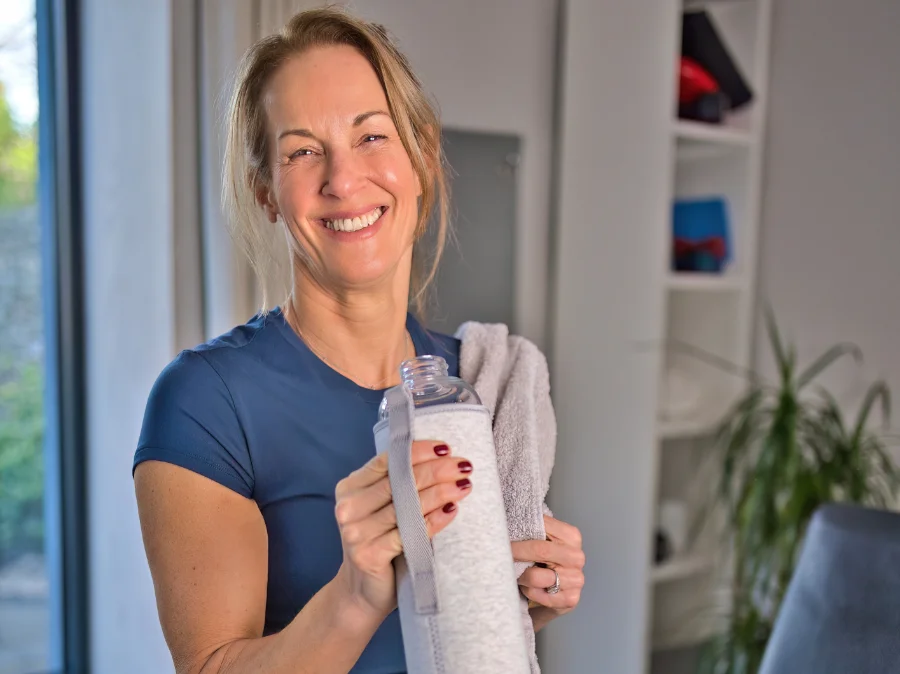Around middle age we all notice tell-tale signs of ageing and the changes it brings to our bodies.
We are bombarded with information about our diets and what we should do when we reach this stage. It can be an obvious leap to think you need to overhaul your diet.
From a nutritional standpoint you don’t need to change much as you age – if you are eating an optimally nutritious diet. That’s a big IF, and often what does need to change is being much more intentional about your nutrition needs.
The big difference is your body becomes much less forgiving of a poor diet as you age.
So, midlife can be a good time to assess your diet and how well it’s serving you. With hormonal shifts and potential health concerns on the horizon, getting on top of your nutrition now can really make a big difference to how you feel and function. Combine these dietary shifts with your training (especially strength training) and you can feel stronger, leaner and healthier than ever.
Here are some areas to consider:
1. Protein intake: Essential for muscle growth and preservation
Muscle mass naturally declines with age – by a considerable amount. This is partly influenced by hormonal shifts. Providing your body with a supply of protein combined with weight-bearing exercise (resistance training) will grow and maintain your muscle mass. It’s never too late to start. Think of your muscles as essential organs that:
- Improve your movement – for favourite sports and everyday tasks
- Help maintain your bone density, avoiding osteoporosis
- Keep your joints stronger and healthier
- Provide better, stronger posture
- Enhance balance and stability
- Aid recovery from training
Another symptom of reduced muscle mass as we age is a lowering of your metabolic rate. This equates to less calories used and is often part of the explanation for weight gain in middle age.
So… adequate consumption of protein in your diet coupled with resistance training gives you the foundations to stay strong and active and in shape.
How much protein do I need?
Your approximate target intake should be 1.2–1.5g of protein per kg of body weight. For example, if you weigh 60kg, aim to eat 70–90g of protein daily. If you consider that a chicken breast has about 20g of protein, meeting this target amount often requires quite a change to our eating habits.
Try to distribute your protein intake throughout the day by including protein in all your meals, rather than consuming large amounts at a single meal. This will optimise the way your body uses protein.
When planning meals; think about the lean, quality, protein source first – get that amount right and then build your plate with veggies and carbohydrates.
Don’t forget breakfast – starting the day with a significant protein source makes it much easier to reach your target amount. Ideas include: Greek yoghurt, smoked salmon, and eggs (especially egg whites).
2. Carbohydrates: Fueling physiological functions
Carbohydrates provide the easiest source of energy for your bodily functions, including cognitive processes and physical activity. The complex, non-processed carbohydrates found in fruits, vegetables, and whole grains provide fibre, vitamins, and minerals and play an important role in your diet.
Carbohydrates are the food stuff of your microbiome. Often referred to as the second brain, your microbiome is involved in numerous body functions. The fibre in carbohydrates supports a healthy gut microbiome, which is essential for optimal digestion and metabolism – particularly during midlife. It contributes to glucose regulation, which helps stabilise energy levels.
Prioritise complex, non-processed carbohydrates found in fruits, vegetables, and whole grains. They take longer to metabolise and are more satiating. Think how much fuller you are after eating three whole oranges rather than the equivalent as orange juice, even though the calories are the same.
3. Fats: Low-fat diets do not mean reduced weight gain
While fats do contain more calories per gram, they do not make you gain weight. The only way to gain weight is to be in a calorie surplus. Calories come from all the food groups.
Fats are key to an optimal diet. Some fats are essential key building blocks in the body and severe restriction of fats leads to hormonal disruption.
Balance out the fats in your diet into three types:
- monounsaturated (olive oils and other plant oils)
- polyunsaturated (oily fish is the main source)
- saturated (dairy products and red meat)
Try to avoid all man-made fats (hydrogenated, trans fats etc) – these can be harmful and offer little to no nutritional value.
4. Alcohol
Alcohol has more calories per gram than protein and carbohydrates, and less than fat per gram. Alcohol has little to no nutritional value. The issue is that alcohol adds calories to your diet but nothing else. So, when you are eating a well-balanced diet it can often be alcohol that tips us into a calorie surplus, leading to weight gain. Alcohol also disrupts sleep quality, especially as we age.
These are all good reasons to limit our intake now, and enjoy alcohol but in moderation 🙂
5. Dietary considerations for menopausal symptoms
Sadly there aren’t a lot of quick fixes from dietary changes. Small reductions in menopause symptoms have been associated with a plant-based dietary pattern, though individual responses vary. Soy-based foods, such tofu and edamame, can be good choices if they contain isoflavones, as these can help alleviate hot flashes.
I would always recommend going to your doctor and getting professional advice.
6. Pre- and post-workout nutrition: Optimising performance
The necessity for pre- or post-workout snacks depends on the type of exercise and the timing of meals. A combination of protein and carbohydrates can optimise energy levels and recovery.
Current research shows no benefit to fasted cardio workouts. You will have a better training session if you eat before your session – or fuel up – the training outcome is the most important thing.
Consider the reasons behind snacking: differentiate between genuine hunger and other triggers.
7. Weight management: Prioritising health habits
Focus on establishing sustainable dietary and lifestyle habits, including regular exercise, adequate sleep, and stress management. These factors together contribute more significantly to overall health than isolated fad diets.
Slow and steady wins the race…
8. Supplementation: Addressing nutritional gaps
Certain nutrients, such as Vitamin D and omega-3 fatty acids, may require increased attention during midlife. Ideally, nutrient intake should primarily come from a diverse diet, with supplements used to address specific deficiencies.
9. Hormonal balance: The role of nutrition
While specific foods cannot “balance” hormones, a well-balanced diet provides the necessary nutrients for optimal hormonal function. A holistic approach to nutrition supports overall well-being.
Key takeaways
Most of us need to increase protein intake and make it the main focus in all our meals.
Eat an optimally nutritious diet of fats and carbohydrates, avoid processed foods.

